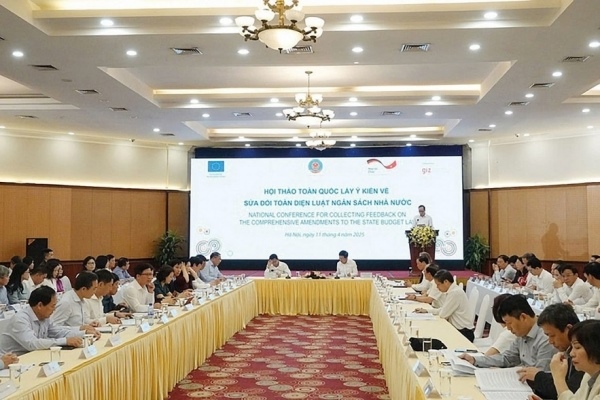Revision of State Budget Law set to boost national development
Revision of State Budget Law set to boost national development
The Ministry of Finance is finalising a draft on the amended Law on State Budget to present to the National Assembly at its upcoming ninth session of the 15th National Assembly Legislature in May.
According to Deputy Minister of Finance Ho Sy Hung, a comprehensive revision of the Law on State Budget is, "A crucial and strategic task for the management and application of the nation's public finances."
|
Deputy Minister Hung made the statement at a national conference to solicit feedback on the comprehensive revision of the Law on State Budget, held in Hanoi on April 11.
The amended Law on State Budget has been developed to fully institutionalise the party and state’s guidelines and orientations; ensuring consistency and synchronisation across the legal framework; encouraging decentralisation and delegation of authority to enhance proactivity, flexibility, and autonomy at the local level; building upon the achievements of the current law; and amending outdated provisions to remove complexities.
Agreeing with the importance of revising the law, Kristina Buende, head of Cooperation at the EU Delegation to Vietnam, proclaimed that revising the Law on State Budget is a significant step forward in ushering the country into a new stage of development.
"In every country, the budget law is considered a fundamental legal instrument for economic development, infrastructure building, and attracting foreign investment. The EU believes that this law, if developed with a strong spirit of innovation and modernisation and a sound legal foundation, will help Vietnam achieve sustainable, inclusive, and comprehensive growth," said Buende..
Vu Duc Hoi, director general of the State Budget Department under the Ministry of Finance, noted that the draft law amends and supplements provisions for the reformation of the revenue assignment mechanism between the central and local budgets, aiming to strengthen the leading role of the central budget while enabling local budgets to exercise greater autonomy and initiative in mobilising and utilising resources for socioeconomic development.
Additionally, the draft law reviews and revises expenditure assignment regulations, clearly delineating the responsibilities and powers of each level in budget utilisation, prioritising resource allocation for key tasks-especially in science and technology, innovation, and digital transformation.
"The draft also reviews, reduces, and simplifies administrative procedures, optimising processes related to budget estimation, implementation, and finalisation," said Hoi.
Speaking at the conference, representatives from local Departments of Finance expressed overwhelming consensus for the need of a comprehensive revision of the law, highlighting several bold and necessary innovations.
According to Tran Van Mi, Vice Chairman of Binh Phuoc People’s Committee, the draft law has resolved many issues faced by localities during implementation.
"For example, it resolves obstacles related to advances from the financial reserve fund, expands allowable expenditures from the budget contingency fund, and eliminates the requirement to develop a three-year financial plan, thereby facilitating both financial agencies and budget-using entities," said Mi.
Director of Ho Chi Minh City Department of Finance Le Huynh Mai proposed the inclusion of a provision allowing localities to implement inter-regional infrastructure expenditures and to expand support policies for both domestic and international localities, in accordance with the financial capacity of each locality, with decisions entrusted to local Peoples' Council.
Furthermore, delegates made several proposals and recommendations to remove existing obstacles and ensure that the draft law is practical and meets burgeoning development demands.
NA deputies expressed hope that the amended Law on State Budget will receive approval at the upcoming ninth session of the National Assembly, thereby establishing a legal framework that effectively supports budget management, contributes to economic stability and growth, addresses social welfare challenges, and resolves emerging issues effectively.
- 17:25 16/04/2025





























